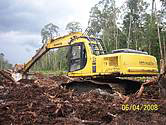Oct 20 2008
Indonesia's newly announced commitment to saving Sumatra is facing an early test, following revelations that Asia Pulp and Paper (APP) had pushed a 45-kilometer, legally questionable logging highway through prime Sumatran tiger habitat.
 An APP associated company opens a Senepis peat forest in Sumatra
© Eyes on the Forests
An APP associated company opens a Senepis peat forest in Sumatra
© Eyes on the Forests
The latest road, passing through protected areas, proposed protected areas and deep peat areas banned from clearing due to massive carbon stores, is the third new controversial logging road associated with APP, under the umbrella of its holding group Sinar Mas Group (SMG) and affiliates, to come to light in the past year.
The existence of the road, servicing two equally controversial APP and affiliate-owned concessions in the Senepis lowland forest, was revealed in an investigative report issued today by the Eyes on the Forest group of NGOs battling deforestation in Raui Province. The group, including WWF-Indonesia and local NGOs Jikalahari and Walhi Riau, has highlighted previous instances of illegal clearing by APP and other companies in the central Sumatran province which has recorded some of the world's highest deforestation rates.
“Unfortunately, this logging project is just the latest in a continuing pattern of wholesale natural forest destruction by APP and its associates in Sumatra,” said Johny Setiawan Mundung, Director Executive of Walhi Riau.
“Our field investigators found that APP has completed a 45-kilometer highway through the Senepis peat forest and paved nearly half of it already, even though we could find no permit for the road.”
The revelations come just over a week after the Indonesian ministers of Forestry, Environment, Interior and Public Works were joined by all 10 provincial governors from Sumatra at the World Conservation Congress in Barcelona, Spain to announce a commitment to protect the natural forests and ecosystems of the world's sixth largest island.
Draining or disturbance of the deep peat soils under forests such as Senepis results in globally significant emissions. Global discussions on financial mechanisms for avoided deforestation could soon result in countries like Indonesia receiving more from investors for forest preservation than forest destruction.
“The building of this road has resulted in a massive, 50-meter-wide gash of opened forest along the 45 kilometers,” said Hariansyah Usman, deputy coordinator of Jikalahari. “The road splits the Senepis peat forest in two, releasing significant amounts of climate-altering carbon emissions from the clearing and drainage canals on both sides.”
Clearing and road building in the area have also been linked with an upsurge in human tiger conflict. NGOs report that at least eight people have been killed by tigers since the APP started clearing the forest block for its pulpwood plantations in 1999.
The Eyes on the Forest report notes that large areas of both concessions were at one point listed for inclusion in a proposed Tiger National Park and subsequent unexplained changes to the proposal saw it expanded to a larger area offering much less protection to the critically endangered tigers and including only very small areas of the logging concessions.
The two APP-affiliated logging concession holders in Senepis, PT Ruas Utama Jaya and PT Suntara Gajapati, are among 14 timber and pulp companies currently being prosecuted by Riau Police for alleged environmental and forest crimes, following revelations by Jikalahari and Walhi Riau.
There is a province-wide de facto logging moratorium in place as Riau Police conduct an illegal logging investigation involving APP and other companies. NGOs charge the company with using the moratorium to put in place infrastructure such as roads for a renewed assault on Sumatra's forests.
Previous reports by NGOs this year found that APP and its affiliated companies were opening new logging roads and clearing natural forest in the Kampar peatland forest, a high emission risk area, and the Bukit Tigapuluh dry lowland forest block, critical habitat for orangutans, tigers, elephants and the Orang Rimba indigenous peoples.
“Major paper customers all over the globe have cut ties with APP because of its unsustainable and likely illegal activities,” said Nazir Foead, director of corporate engagement WWF-Indonesia. “We call on APP to stop this unsustainable clearing of our forests and to start behaving as a responsible corporate citizen. We recommend current and future buyers and investors of APP not to have any business with APP until that time.”
Among the companies that have stopped buying from APP because of its business practices in Sumatra are Staples Inc., the largest office retailer in the United States; the Ricoh and Fuji Xerox Groups, both headquartered in Japan; the Metro Group in Germany and Woolworths of Australia.